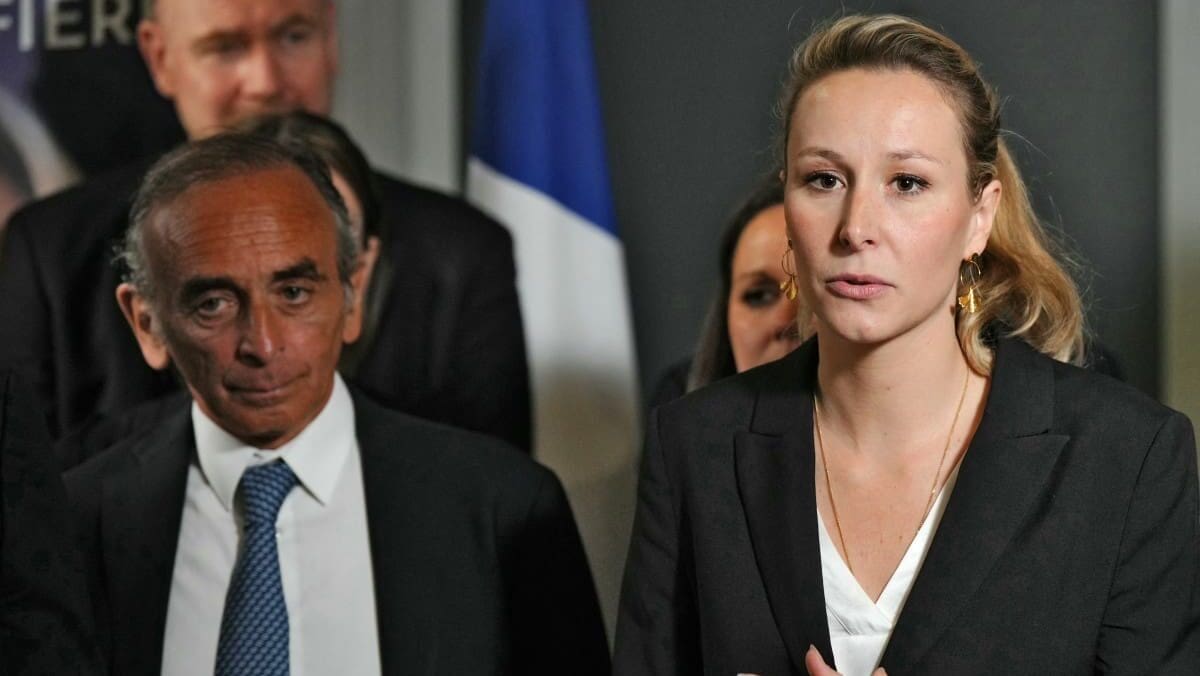
Marion Maréchal delivers a speech next to Reconquête president Eric Zemmour during the official presentation of the party’s list in Paris, on May 7, 2024.
Photo: Dimitar DILKOFF / AFP
The frantic wheeling and dealing to prepare for France’s snap parliamentary elections, which President Emmanuel Macron scheduled surprisingly for the end of June, is exacerbating tensions within and between the various parties of the French Right.
After she attempted to negotiate an alliance between Le Pen’s Rassemblement National (RN) and her own party, Reconquête, Marion Maréchal was disowned by leader Éric Zemmour and expelled from the party, along with three other newly elected MEPs.
As our managing editor Ellen Kryger Fantini argued before the European Parliament (EP) elections, the Right should take care not to score an ‘own goal’ by squabbling over political territory.
Tuesday, June 12th, was a particularly eventful day on the stage of French politics. On the Right, the June 9th announcement of Macron’s dissolution of the National Assembly was followed by discussions between the personalities from the three major parties in order to forge an alliance that would win an absolute majority—both against the Left, united in a new alliance dubbed the Popular Front, and against the likely-to-lose presidential camp.
The RN and Les Républicains (LR), represented by party president Éric Ciotti, had reached an agreement to put forward joint candidates. However, Ciotti’s approach has been disavowed by his party’s historic caciques (local political bosses), who take a dim view of the right-wing nature of the RN with its Gaullist past and are manoeuvring to have him ousted.
An intense legal battle is expected, given that Ciotti officially remains the party’s president, chosen by the membership, and that the party leadership decision to remove him has no legal validity as its meeting was assembled in defiance of the statutes.
Meanwhile, Marion Maréchal, the elected head of list for the Reconquête party, remained true to her commitment to uniting the Right. She stepped up her formal and informal contacts with the Rassemblement National to present a common front for the legislative election. Negotiations collided with the reluctance of the RN to associate itself with Éric Zemmour, whose communication was systematically hostile towards the RN during the few months of the campaign for the EP elections.
The press also brought to light an internal crisis at Reconquête that had in fact been going on for several months. A strategic breaking point had been reached, coupled with stubborn personal resentments, between Zemmour’s and Maréchal’s teams.
Faced with this deadlock, Marion Maréchal, supported by the other MEPs elected with her on Sunday—with the exception of Sarah Knafo, Zemmour’s companion—announced that she wanted to give priority to working for the union of the Right, rather than running Reconquête candidates against the RN, which would run the risk of losing to the Left or the Centre.
Zemmour’s response was swift. On the evening of June 12th, he announced on BFM TV the ousting of Marion Maréchal and her supporters from the Reconquête party, in particularly violent terms. He accused the MEPs who had previously followed him of being “world-record betrayers“—seemingly forgetting that he himself had benefited from the support in 2022 of the RN—support he would never have described as treason at the time. He also accused Maréchal of being a fan of “family reunification” because of her discussions with her aunt Marine Le Pen—an innuendo-filled remark, given that the same term is used for the French policy of bringing foreign members of an immigrant’s family onto French soil.
Since this outburst, many uncertainties remain, on both the European and the national level. At an EP level, it is not yet known what will become of the MEPs excluded from Reconquête—Marion Maréchal, Nicolas Bay, Guillaume Peltier, and Laurence Trochu. At the national level, individual agreements are multiplying, enabling candidates from the ranks of Reconquête to find a place on the electoral map drawn up by the RN. A union of the Right is therefore taking shape on the ground, albeit painfully and amidst chaos.
